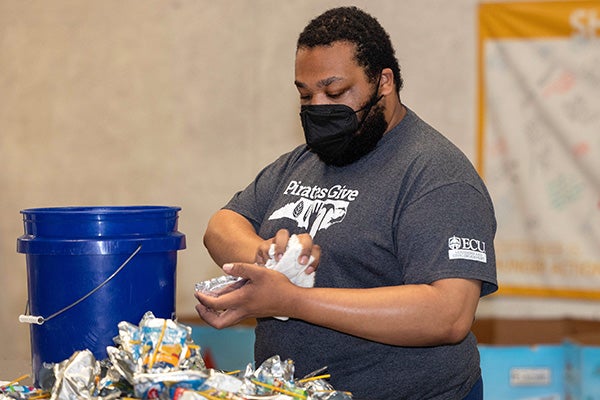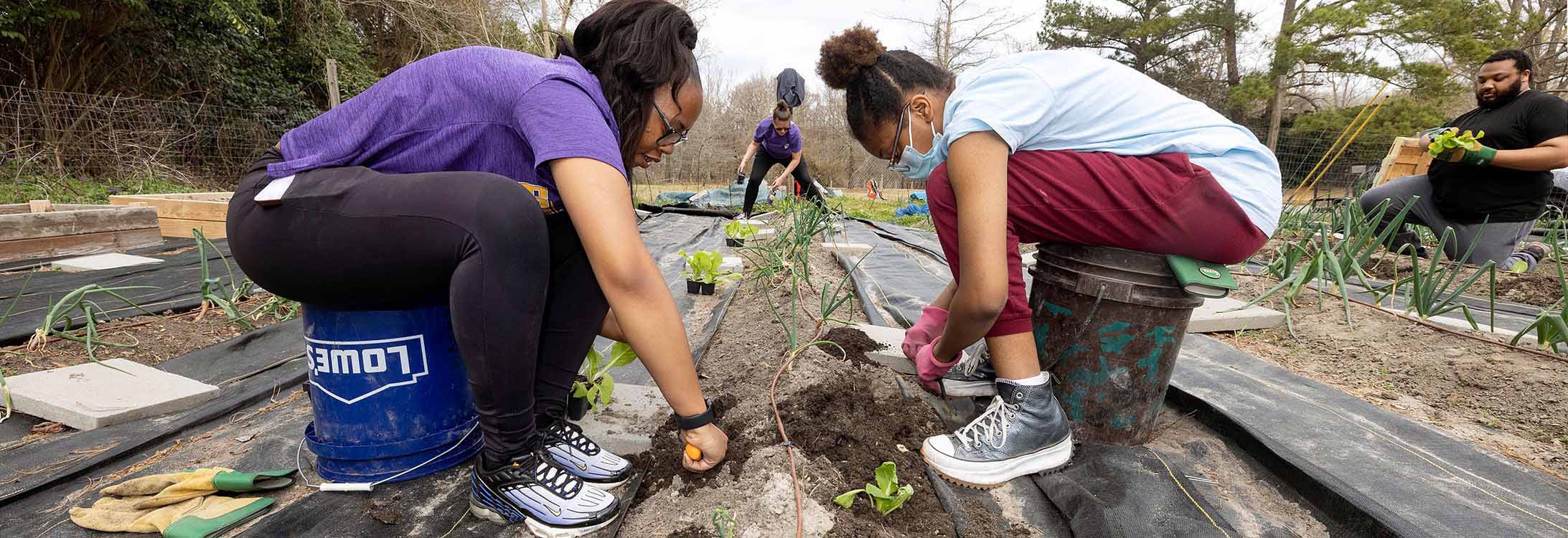SERVING OTHERS
Students make a difference in community over spring break

Honors College students spent time at the Coastal Studies Institute as part of their spring break trip exploring how climate change is impacting the Outer Banks. (Contributed photo)
EXPLORING CLIMATE CHANGE
Ten Honors College students participated in a different type of spring break beach trip. As part of their honors seminar “From Barriers to Agency,” the students traveled to the Outer Banks to see the impact that climate change and humans have on the barrier islands.
Starting at the Coastal Studies Institute in Wanchese, students took a guided boat tour of the Pamlico Sound before stopping at unique locations including Jockey’s Ridge, Jeannette’s Pier and the Cape Hatteras Lighthouse.
“Our trip to the Outer Banks opened my eyes to the effects that climate change has on not only the environment but the people living there as well,” said Elizabeth Chan, a junior majoring in biology and Hispanic studies.
The trip culminated in a four-day stay on Ocracoke Island where students immersed themselves in the community. From exploring salt and algae flats and beachcombing on Portsmouth Island to spending time with the National Park Service and talking to Ocracoke residents, students studied the many ways that climate change has affected the island ecosystem.
“We talked to family members who have lived on Ocracoke for 10 generations and have seen the impacts of climate change from receding shorelines to 100-year storms like Hurricane Dorian,” Chan said.
Dr. Tammy Lee, Dr. Mark Newton and Bonnie Glass, science education faculty teaching the seminar, led the trip.
According to the faculty, students’ interactions with various stakeholders and nature provided authentic experiences allowing them to develop a deeper understanding of the complexity of the issues that they couldn’t experience in a classroom.
“Our professors planned an amazing trip that enabled me to develop a new appreciation of the Outer Banks and a greater understanding of how it is combating climate change,” Chan said.
From preparing garden beds for spring planting to delivering food to people in need, East Carolina University students on spring break last week learned about food insecurity close to home.
ECU’s Center for Leadership and Civic Engagement partnered with local community organizations to provide opportunities for students to address a variety of social causes through the Alternative Break Experience (ABE) program.
In Greenville, ECU students started the week at the Food Bank of Central and Eastern North Carolina, where they wiped the outside of donated juice pouches and packed them in boxes.
ECU junior Shayia Coltrane of Greensboro, who is majoring in social work, said one of the most rewarding things about ABE is making a difference. “It’s a good experience to give back in the community,” she said. “You’re serving the people who live here.”
That feeling has stuck with Coltrane since participating in her first ABE as a freshman, when she helped build three houses and was able to meet the people who were going to live there. “Seeing something from start to finish is the best part of ABE, and to see the result of the impact right there,” she said.
Tynajja Pittman of Rocky Mount, a senior majoring in public health, said participating in alternative spring break helped to complete community service hours required for her capstone or senior project. “It’s the only time I have to do it,” said Pittman, who also works part time with student health.
Pittman and Coltrane were looking forward to weeding and preparing beds in the community gardens in Bethel and Greenville, potentially transplanting cabbages and onions, and possibly even driving a tractor. “My grandma has a garden, but I’ve never gotten down and dirty with the weeding and planting,” Coltrane said. “If they let me on the tractor, I’ll go.”
Katy Locke, assistant director with ECU’s Center for Leadership and Civic Engagement, was the staff lead on the trip along with Demetrice Sheard, AmeriCorps VISTA member at ECU. Locke said it’s important to expose students to food insecurity, hunger and food deserts, where people have limited or no access to healthy food. “You realize it’s a lot more common than people see,” Locke said. “There is no pause to hunger. It doesn’t sleep.”
On campus, the group worked in the Purple Pantry — an on-campus food bank aimed at reducing food insecurity — to prepare for a huge “Pack the Pantry” food drive this month, and to build a mini-pantry for the health sciences campus. In addition to the planned new mini-pantry, the Purple Pantry is open at three locations along with a mini-pantry on main campus.
Locke said they’ve seen an increase in need for the pantry since the fall semester. In August, even though it was a short month, they had about 20 visits. In November, there were 150 visits, Locke said.
Terrell Saunders, a senior from Wilson, said outreach from community gardens and food banks helps fill the gaps that exist from eastern North Carolina food deserts. “You can drive miles without seeing a grocery store,” he said.
In addition to the ABE in Greenville, another group of ECU students worked with the N.C. Coastal Federation on oyster reef construction and nature trail maintenance in Carteret County and at a rain garden in Swansboro. And in Raleigh, ECU students learned about citizenship by registering voters, volunteering at a local food bank and nonprofit resale store, and visiting the N.C. Legislature, N.C. Supreme Court and several museums.

Terrell Saunders wipes juice pouches at the Food Bank of Central and Eastern North Carolina.
